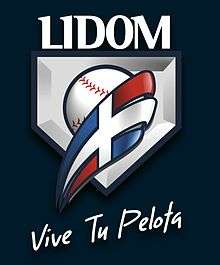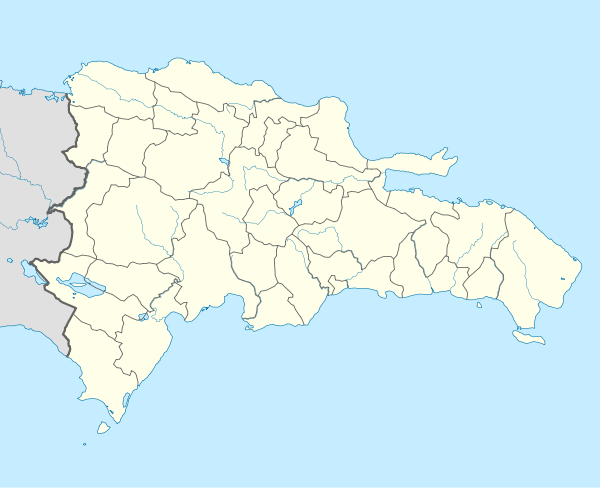Dominican Professional Baseball League
The Dominican Republic Professional Baseball League (Spanish: Liga de Béisbol Profesional de la República Dominicana) or LIDOM by its acronym in Spanish, is a winter professional baseball league consisting of six teams spread across the Dominican Republic; it is the highest level of professional baseball league in the Dominican Republic. The league's players include many prospects that go on to play in Major League Baseball in the United States while also signing many current MLB veterans. The champion of LIDOM advances to play in the yearly Caribbean Series.
 | |
| Sport | Baseball |
|---|---|
| Founded | 1951 |
| No. of teams | 6 |
| Country | |
| Most recent champion(s) | Toros del Este (2019-20) |
| Most titles | Tigres del Licey (22 Titles) |
| Official website | lidom.com |
Each team plays a fifty-game round-robin schedule that begins at the middle of October and runs to the end of December. The top four teams engage in another round-robin schedule with 18 games per team from the end of December to the end of January; the top two teams in those standings then play a best-of-nine series for the national title. The league's champion advances to the Caribbean Series to play against the representatives from Mexico, Venezuela, Cuba and Puerto Rico.[1]
Current teams
| Team | City | Stadium | Capacity |
|---|---|---|---|
| Águilas Cibaeñas | Santiago | Estadio Cibao | 18,077 |
| Estrellas Orientales | San Pedro de Macorís | Estadio Tetelo Vargas | 8,000 |
| Gigantes del Cibao | San Francisco de Macorís | Estadio Julián Javier | 12,000 |
| Leones del Escogido | Santo Domingo | Estadio Quisqueya | 14,469 |
| Tigres del Licey | Santo Domingo | Estadio Quisqueya | 14,469 |
| Toros del Este | La Romana | Estadio Francisco Micheli | 10,000 |
Former teams
- Caimanes del Sur (San Cristóbal) 1983-1989
- Delfines del Atlántico (Puerto Plata) (This team did not play and was never officially in the league)
- Pollos del Cibao / Pollos Nacionales / Pollos Béisbol Club (San Francisco de Macorís) from 1999-2002, previously Gigantes del Nordeste, currently Gigantes del Cibao
History
For his close involvement in the Dominican league's establishment and early development, Pedro Miguel Caratini (born ca. 1880) has been called "the father of Dominican baseball".[2]
During the years 1930-1963, military dictator General Rafael Trujillo can be credited with furthering the sport of baseball in Dominican Republic. Trujillo encouraged many sugar refineries to create teams of cane cutting laborers to play baseball during the idle months of cultivation. Fostering high levels of competition, the organization structure continued to mature stimulating growth in the intensity and popularity of the game.[3]
In 1937, teams of the Dominican Republic signed a large number of players from the Negro League of the United States. These players were given large salaries by Dominican men with money and political power. Among these players were baseball stars James Thomas "Cool Papa" Bell and Satchel Paige. However, these contracts exhausted team finances, leading to a decline of Dominican baseball until 1950.[3]
Founding teams
In the early 1900s, four Dominican teams formed. These teams still exist today, and form the foundation of Dominican professional baseball:
- Tigres del Licey (1907)
- Estrellas Orientales (1911)
- Leones del Escogido (1921)
- Sandino, later renamed Águilas Cibaeñas (1937)
Cultural impact
Baseball was first brought to the Dominican Republic by Cubans fleeing the Ten Years' War. At first, it struggled to gain popularity, being confined mostly to the Cuban exiles, but its popularity grew as more and more native-born Dominicans took it up. The growing popularity of the sport led to the formation of LIDOM. The formation of the new domestic baseball league allowed Dominican players to flourish away from the racism and pressures of the American game. The sport's domestic popularity and the new league increased the bond that many spectators felt with their teams; even today, many Dominicans feel tightly connected to the sport.
Community-level impact
As a cultural icon of the Dominican Republic, baseball holds a strong presence in the country. Surrounded by impoverished neighborhoods, baseball stadiums in larger Dominican cities are routinely maintained. Owners of big businesses like sugar refineries funded the construction of these fields to benefit from the games. Games in these stadiums attract major crowds and a sense of community can be observed.[4] Like their American counterparts, these "latinized" games exude free-spiritedness, social cohesion, and festivity from the fans and players alike.[5] In the Dominican Republic, baseball players are regaled as sports heroes and function as role models to their fan base. This idolization is covered by the media more so than in the United States.[3]
The Dominican Republic is a developing country, struggling with poverty. In 2016, 30.5 percent of Dominicans lived below the poverty line, while 5.5% of Dominicans were unemployed.[6] With poverty costing many Dominicans a chance to get a higher education, many look up to the great success of those who become successful baseball players, and see baseball as an escape from poverty. Because of this, children begin playing organized baseball as early as six years old,[5] and compete with others in leagues with the hopes of being recognized by baseball scouts.
Some argue that the perception of baseball as economic salvation is in reality detrimental to the youth of the Dominican Republic, as it promotes seeking baseball success at all costs, at the expense of pursuing higher education[5]
American hegemony inside Dominican baseball
After Fidel Castro's revolution in Cuba and the subsequent U.S. blockade, scouts of the majors turned their sights towards the Dominican Republic.[3] Posed with the opportunity to acquire quality talent at a reasonable price, major league teams established "working relationships" with Dominican professional teams.[7] Since the 1950s, all 30 MLB franchises have established baseball training academies in the Dominican Republic[8] which are tasked by their respective teams to condition and prepare young Dominican prospects for a chance at further developing in the United States. Having produced many successful athletes from these academies, these academies undercut the reliance of U.S. teams on Dominican baseball organizations. [7]
Championship history
| Season | Champion | Manager | Runner-up |
|---|---|---|---|
| 1922 | Leones del Escogido | Luis Alfau | Tigres del Licey |
| 1923 | Incomplete season | ||
| 1924 | Tigres del Licey | Charles A. Dore | Leones del Escogido |
| 1929 | Tigres del Licey | Charles A. Dore | Leones del Escogido |
| 1936 | Estrellas Orientales | Enrique Mejía | Tigres del Licey |
| 1937 | Dragones de Ciudad Trujillo | Lázaro Salazar | Aguilas Cibaeñas |
| Won Caribbean Series |
*Two Dominican teams participated in the Serie del Caribe in 2008
| Team | Championships |
|---|---|
| Tigres del Licey | 22 (2)* |
| Águilas Cibaeñas | 21 |
| Leones del Escogido | 16 (1)* |
| Estrellas Orientales | 4 (1)* |
| Toros del Este | 3 |
| Gigantes del Cibao | 1 |
| Caimanes del Sur | 0 |
| Dragones de Ciudad Trujillo | 0 (1)* |
*Championships won before LIDOM (1951)
See also
References
- HISTORIA DE LA SERIE DEL CARIBE Archived February 5, 2011, at the Wayback Machine. Accessed on 2011-01-12.
- Van Hyning, Thomas E.; Valero, Eduardo (1995). Puerto Rico's Winter League: A History of Major League Baseball's Launching Pad. McFarland. p. 1.
- Klein, Alan. "Baseball as Underdevelopment: The Political-Economy of Sport in the Dominican Republic". Northwestern University, 1989
- Gordon, Dan. "Winter League Escapades: Dispatches from Ballparks in the Dominican Republic". University of Nebraska Press, 2001
- Klein, Alan. "American Hegemony, Dominican Resistance, and Baseball". Dialectical Anthropology, 1988
- "Central America :: Dominican Republic — The World Factbook - Central Intelligence Agency". www.cia.gov. Retrieved 2020-07-09.
- Klein, Alan. "Culture, Politics, and Baseball in the Dominican Republic". Latin American Perspectives, 1995
- Jessop, Alicia (March 19, 2013). "The Secrets Behind The Dominican Republic's Success In The World Baseball Classic And Major League Baseball". Forbes. Retrieved January 3, 2014.
